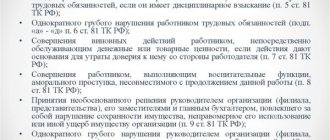A reprimand is one of the least severe forms of disciplinary action imposed for violations. It is equivalent to a regular remark. It is used when necessary to draw a person’s attention to shortcomings, misdeeds and mistakes. A reprimand is a reprimand with a simultaneous chance to improve. After receiving several such reprimands, employees wonder how many such reprimands are necessary for dismissal. This article can answer this question. After reading it, you will find out what a reprimand is, whether they are fired from work for it, and, if possible, under the article or on other grounds.
Concept of reprimand
Before describing what constitutes a reprimand, it is worth noting that one such measure or several in a row cannot become a direct basis for dismissal. The manager himself will decide here. Usually, a reprimand becomes grounds for non-payment of bonuses or cancellation of cash bonuses, but not for dismissal.
So what is a reprimand? This is a special form of reprimanding an employee. In terms of severity, it comes immediately after the remark. Unlike the second, it is issued at the official level, formalized by order.
There is only one wording here - a reprimand. You cannot add the words “with note” or “strict”.
If an employee discovers this factor, he can go to court to challenge it. The use of this combination of words is considered illegal.
Reasons for receiving a reprimand
You can receive a similar form of sanction for actions that involve violation of a certain job description, previously executed agreement and internal regulations. Here are some examples of such violations:
- failure to fulfill labor duties;
- poor quality performance of assigned work;
- no-shows, repeated absenteeism, numerous tardiness;
- causing damage to the employer, serious damage and theft;
- inciting unpleasant conflicts;
- intoxication;
- providing false documents.
Certain requirements are reflected in the modern Federal Law. There are those offenses that are provided for by the official local acts of the employer. The main thing is that they fully comply with the legislation of the Russian Federation.
What is a reprimand?
One of the forms of penalties is a reprimand, which is expressed in official censure of an offense in writing - an order. The wording of this punishment can only sound like this - contrary to popular belief, no other types of reprimand, such as “severe reprimand”, “reprimand with entry”, etc. According to the current Russian legislation, they do not exist, and their use has been recognized as unlawful in judicial practice.
For your information
The very concept of a disciplinary offense in the form of a reprimand implies failure to fulfill or improper performance by an employee of the duties assigned to him in the employment contract, job description, as well as the employer’s LNA.
Violation of labor discipline will be considered : failure by an employee to fulfill his immediate duties, being late or absenteeism for work, committing theft or damage to property, appearing in a state of any kind of intoxication, providing false documents during employment, etc. Some of such violations are enshrined in federal labor legislation, others may be reflected in the local regulations of the employer, and in order for these provisions to have legal force, the organization’s staff is familiarized with them upon signature.
Sanction repayment terms
Penalty in the form of a reprimand can be used after 6 months from the date of violation. If a special audit was carried out at the enterprise, this period increases to 2 years. Such penalties are lifted automatically. But provided that during this time the person does not receive new penalties. Also, the employer himself can lift the penalty at the request of his employee.
It is impossible to expel an employee for this form of reprimand. The quantity doesn't matter here. In principle, there is no such article in the labor code. Moreover, it is allowed to dismiss a person only for violations for which certain disciplinary sanctions were not applicable. These are the grounds prescribed in Art. 77, 80 Labor Code of the Russian Federation.
So, it is illegal to deprive a person of work directly for receiving reprimands. But you can dismiss only if there are misconduct under clause 5 of Art. 81. If an employee has repeatedly, without good reason, violated his obligations, if he has an outstanding penalty, he may be dismissed and, to some extent, this will be dismissal for a prescribed reprimand.
When is a reprimand issued?
The legislator limited the time limits for issuing disciplinary sanctions in the form of reprimands. The maximum waiting period depends on individual external factors. However, it is prohibited to issue a reprimand after the expiration of the following periods:
- One month (30 days from the date of discovery of the offense) . Classic norm. Applicable in all cases. But here it is worth considering such basic nuances. The month begins to count from the moment the employer establishes the fact of a violation committed by a specific employee. The period is given to conduct an investigation, collect evidence, prepare and sign relevant orders.
- Six months . This is the maximum period for which the date of final signing of the order can be delayed. Calculated from the day the violation was discovered. It can only be applied if, before the end of the month allotted by law, the employee fell ill, went on a business trip, or took educational or regular leave. After this period, even if there was something to punish, the employer can no longer issue a reprimand.
- Two years . Exactly this amount is allocated to companies for inspections by audit services. If during the audit process violations are discovered that warrant disciplinary action, the administration has the right to apply them. But this applies exclusively to audit acts.
Remember, delays in issuing a penalty may result in such an action being declared illegal. Therefore, if the employee is really guilty, you should not delay in issuing a punishment in the form of a reprimand.
Number of reprimands for dismissal?
Modern legislation does not determine the total number of sanctions under consideration on the basis of which an employee can be dismissed. In other words, you can be fired even with one such censure and subsequent violation of discipline. In most cases, repeated violations are required.
If a person receives a reprimand, immediately the second and the next, he may be fired. The number of penalties is determined by the employer. It also relies on the essence of the violation. Dismissal for reprimands can only be made under the following circumstances:
- This rule was established by the employer - it determined the number and reasons for reprimands.
- They can be fired for several reprimands at once, or one after another, but for different reasons.
- The employee committed such shortcomings as failure to fulfill duties, as well as repeated misconduct.
Different penalties cannot be imposed on the same offense.
If a person has been reprimanded for a specific violation, he cannot legally be fired for the same. You can lose your job only if there are such accompanying factors as:
- Repeated violations. Dismissal may be applicable if new misconduct is discovered while a past penalty is outstanding.
- A one-time, fairly serious offense.
If a person does not have various outstanding penalties, the contract can be canceled under clause 6 of Art. 81 Labor Code of the Russian Federation. Here are all the reasons why you could lose your job. Each of the reasons is interpreted exclusively unambiguously. The employer usually does not have problems with the interpretation and implementation of the required actions.
How many reprimands are enough for dismissal?
This criterion is not established by law. But dismissal of an employee for a reprimand can only be carried out under the following conditions:
- the employee has failed to fulfill his duties repeatedly and already has existing disciplinary sanctions;
- The employee committed a single gross violation of discipline.
In the first case, the company's management has the right to dismiss an employee when a new violation of discipline is recorded, if before that he has already been punished for guilty labor actions, and it has not yet been extinguished.
Additional Information
Termination of an employment contract with an employee who has no disciplinary sanctions is permissible only on the grounds set out in clause 6, part 1, article 81 of the Labor Code of the Russian Federation. The list has been recognized by the courts as exhaustive and cannot have expanded interpretations.
Dismissal procedure
Dismissal of an employee with repeated reprimands for gross violations is carried out strictly in a certain order:
- The employee is reprimanded.
- The violation is being recorded. At this stage, a memorandum and an act with the testimony of witnesses are drawn up. Their statements are taken as a basis.
- An investigation commission is being created. Based on the order, a certain number of employees are assembled. They must carry out inventory and other activities.
- A search for confirmation is carried out. This may include official results of medical examinations, examination results and audit reports. The offending employee must participate in these activities. If he refuses this, a special act is drawn up.
- A thorough check is carried out to determine the availability of benefits. For example, pregnant women cannot be deprived of their jobs, even if the offenses are quite serious.
- The employee is asked to write an official explanatory note. This document is compiled exclusively in free form. Two copies are created and the signature of the responsible person is affixed. If the explanatory note has not been written within two days, if the employee refuses to draw it up, a special act is drawn up.
- If a commission was assembled during the investigation, the responsible person draws up an act or a special report.
- Determination of severity. For the dismissal of an employee to be legal, the circumstances of the violation are not classified as valid. Otherwise, the reprimand will be considered illegal.
- Drawing up an order to impose a reprimand. It must be completed within one month from the date the defect was discovered. After the order is issued, it is transmitted to the employee within three days.
- If a person makes a repeated mistake after a relatively short time, dismissal is triggered. Here an order for deprivation of work is already drawn up, which is drawn up in form T-8.
- After dismissal, final actions are required. A calculation is issued and the work book with the corresponding entry is returned.
In this sequence of actions, the most important thing is to record the offense. If the employer violates the procedure and does not complete the necessary documents, other actions may be classified as illegal.
The procedure for dismissal based on a reprimand can be significantly shortened. For example, it is not necessary to create a commission to investigate. In such a case, each action is documented. All instructions, official orders and explanatory notes are handed over to the employee against signature.
Recording in labor
Upon dismissal based on a reprimand, the work book must be filled out in a special way. This rule is spelled out in special government decree No. 225. When issuing a document to a dismissed employee, it must contain the following data:
- employee information;
- information about transfers;
- data on awards received and achievements.
Data on disciplinary sanctions are not reflected in the labor report. The exception is when a person is fired for these violations.
If an employee was fired on the basis of numerous reprimands or for gross violation, the employment record must contain a record that the contract was canceled due to repeated failure to fulfill and violation of labor duties. The article on which the manager relies upon dismissal must be indicated. There are several more rules for registering employment:
- Any abbreviations and various verbal abbreviations are unacceptable.
- The mark on the work record is certified by the signature of the responsible person.
- The organization's seal must be present.
- The date and details of the order for dismissal are indicated in the specially designated fields.
Additionally, a personal card in the T-2 form can be issued. There may be information about reprimands here. It is up to the employer to decide whether to draw it up or not.
Entry in the work book
If the employer decides to part with the person on this basis, a corresponding entry is made in the work book.
A similar entry is made in the T-2 card, in which the dismissed person signs. Any mistakes made, especially if it concerns the work record book, entail unpleasant consequences for the employer - from the need to make changes or issue a duplicate to fines in favor of the state and the need to pay a former employee according to the rules of Article 394 of the Labor Code of the Russian Federation.
Payments to the dismissed
No matter what violations a dismissed employee commits, this cannot serve as a basis for the abolition of payments.
When a person is dismissed due to numerous reprimands or gross violations, he receives a full payment provided for by labor legislation. The employee should not ask for anything or send petitions. The accounting department carries out the required calculations on the day of dismissal. Does this without official orders.
The dismissed person receives the following amounts:
- funds allocated for the period actually worked;
- compensation for unused vacation.
There is no standard severance pay here. And such accruals as bonuses and additional compensation payments are accrued by the director’s decision.
If an employee is absent before dismissal, payment is made no later than the next day after sending him a special message.
Payments and benefits
All violations without exception are not grounds for the abolition of mandatory payments under the Labor Code of the Russian Federation when making the final payment upon dismissal. The citizen must be given a list of everything that is guaranteed, and he is not required to submit a petition for this. The calculation is carried out by the accounting department on the last date of work, and this does not require any separate orders or reminders, since this is directly stated in the Labor Code of the Russian Federation.
In our situation, they give money for actual work and the cash equivalent of unused vacations. Severance pay in the described situation is not provided, but they, as well as various compensatory subsidies, can be transferred at the initiative of the employer or if such a condition is specified in the employment agreement.
If an employee fails to show up for work on the last day, the payment is made on the same or the next day, but no later than after a written request from the citizen to this effect.
Who doesn't get fired?
There are quite a lot of beneficiaries in labor law. Certain manipulations cannot be carried out with certain of them. But as for dismissal on the basis of frequently repeated reprimands, it is impossible to dismiss only a pregnant woman. Employees in this position cannot be deprived of their jobs, even if there are significant violations - Art. 261 TK.
This category of workers can be officially reprimanded and removed from office, but dismissal is strictly prohibited. The remaining beneficiaries can be fired without unnecessary delay.
At the same time, you cannot fire a person if he is on sick leave or on vacation. But in this case, you can send a letter to the employee asking for a written explanation. The person, in turn, must give an answer within two days after the official release.
Challenging dismissal
All categories of imposed penalties can be challenged. This is done by contacting the state labor relations inspectorate and through the bodies that are authorized to resolve disputes.
The dismissed employee needs to write a statement. The document is drawn up in free form. Here you need to state:
- circumstances of the case;
- evidence of innocence;
- requirements.
The procedure for drawing up the contestation process is prescribed in Chapter. 60. If such an appeal does not give a positive result, you can appeal the decision in court.
In Russia, the one who knows his rights wins

If you want to know how to solve your specific problem, then ask
our duty
lawyer online
.
It's fast, convenient and free
or by phone:
Moscow and region:+7
St. Petersburg and region:+7
Federal number:+7
How to record a violation of labor discipline
Due to the fact that the initiative to sever the employment relationship with an employee comes from the employer, it is he who is entrusted with the responsibility of collecting evidence of the person’s guilt, as well as completing all the necessary documentation. Recording of an employee’s violation of labor regulations or safety measures occurs in the internal documents of the organization, which include:
- A memo brought to the employer by an eyewitness to the violation that occurred;
- An act that records information about a person’s misconduct, for example, absenteeism or showing up at the workplace while intoxicated;
- Comparative documentation that records the fact of theft by a person of material assets or the discovery of a shortage of products;
- Other data that is available and proves the fact of a particular violation by the employee. Such materials may include medical examinations, camera recordings, eyewitness testimony, and so on.
Drawing up an Act is necessary to record the deviation from the rules that was noticed by an employee of the organization. It provides real facts of violations without any assessment of the employee’s actions. Based on this document, the employer may require the person to present an explanatory note, the period for drawing up which should not exceed two days from the date of receipt of the request from the boss.
In Russia, the one who knows his rights wins
If you want to know how to solve your specific problem, then ask
our duty
lawyer online
.
It's fast, convenient and free
or by phone:
Moscow and region:+7
St. Petersburg and region:+7
Federal number:+7






